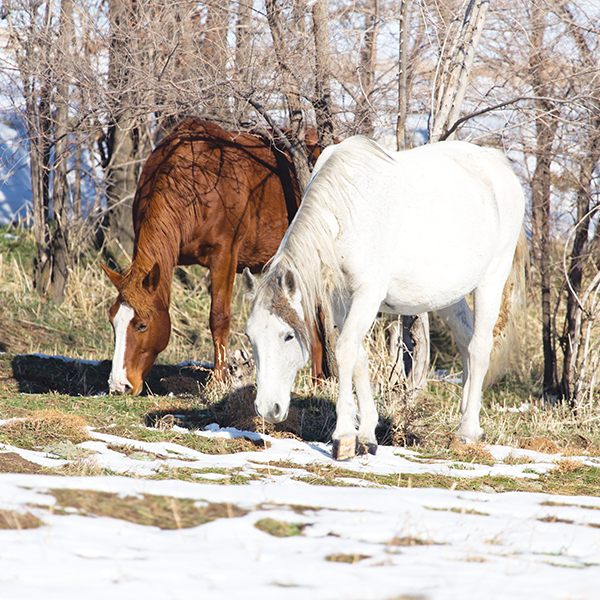Winter conditions in the Mid-south can be very unpredictable. One day it is seventy-two degrees and sunny, the next fifty-nine degrees, raining, windy, and dropping to below freezing when the sun sets. The changes in temperature are hard to adjust to for both man and beast. Just when your horse grows his winter coat and you are wearing a barn coat, we have a day that in the mid seventies.
Winter can be a challenging season for equines, as they are susceptible to the effects of colder temperatures, shorter days, and decreased turnout time. Just like humans, horses also experience Seasonal Affective Disorder (SAD) during this time, which can lead to a range of physical and mental health issues. We will explore various strategies to help mitigate the effects of winter and SAD in equines, ensuring their well-being and overall happiness.
Providing horses with suitable shelter is essential during the winter months. A well-insulated barn or a sturdy shelter can protect them from harsh weather conditions such as wind, rain, and snow. Additionally, ensuring proper ventilation within the shelter is crucial to prevent respiratory issues. Providing horses with cozy blankets can also help keep them warm and comfortable. Understanding when to blanket and when to remove blankets is also key.
Maintaining a balanced diet is crucial for equines throughout the year, but it becomes even more important during winter. Horses require additional calories to generate body heat and stay warm. Horses are grazers by nature and having the ability to have hay allows them to fulfill the desire to forage. Feeding them high-quality forage and increasing their concentrate feed can help meet their energy requirements. It is also essential to always provide them with fresh water, as dehydration can worsen the effects of winter and SAD.
Regular exercise is vital for horses during the winter months to keep them physically and mentally fit. While turnout may be limited due to icy or muddy conditions, providing horses with ample exercise opportunities such as lunging, riding, or even hand-walking can help combat the winter blues. Incorporating mental stimulation through the use of toys, treating puzzles, or obstacles can also keep their minds engaged and prevent boredom. Horses can become bored and restless if left locked up in a stall all day, with no mental stimulation.
One of the primary factors contributing to SAD in both humans and equines is reduced exposure to natural sunlight, as the days become shorter during the winter months. To mitigate this, consider using artificial lighting systems in the barn to simulate natural daylight. These lights can be turned on for several hours a day to help regulate the horse’s internal clock and improve their mood. However, it is crucial to consult with a veterinarian or equine behaviorist to ensure the appropriate lighting setup.
Horses are social animals and thrive on companionship. During the winter months, when turnout may be limited, it is essential to provide opportunities for social interaction. If possible, turn horses out in small groups or arrange playdates with compatible equine companions. Stalling your horse close to a pasture companion, also can prove beneficial. This can help alleviate feelings of loneliness and isolation, reducing the risk of depression and anxiety.
As with humans, maintaining a consistent routine is beneficial for equines, especially during the winter months. Horses thrive on predictability, and a stable routine can help reduce stress and anxiety. Stick to a regular feeding schedule, exercise routine, and turnout plan to provide a sense of stability and security for your equine companions.
It is crucial for horse owners to monitor their horses closely for any signs of SAD or winter-related issues. Watch out for symptoms such as lethargy, decreased appetite, weight loss, changes in behavior, or coat condition. If you notice any concerning signs, it is important to consult with your equine veterinarian. They can provide a thorough evaluation and recommend appropriate treatment options, which may include additional supplements, medications, or specialized therapies.
Winter and Seasonal Affective Disorder can pose challenges for equines, but with proper care and attention, the effects can be mitigated. By providing adequate shelter, a balanced diet, regular exercise, mental stimulation, light therapy, social interaction, and maintaining a consistent routine, horse owners can help their equine companions navigate through the winter months with better physical and mental well-being. Remember to monitor your horses closely and seek professional help if needed, ensuring they receive the necessary support and care to thrive during this challenging season.










